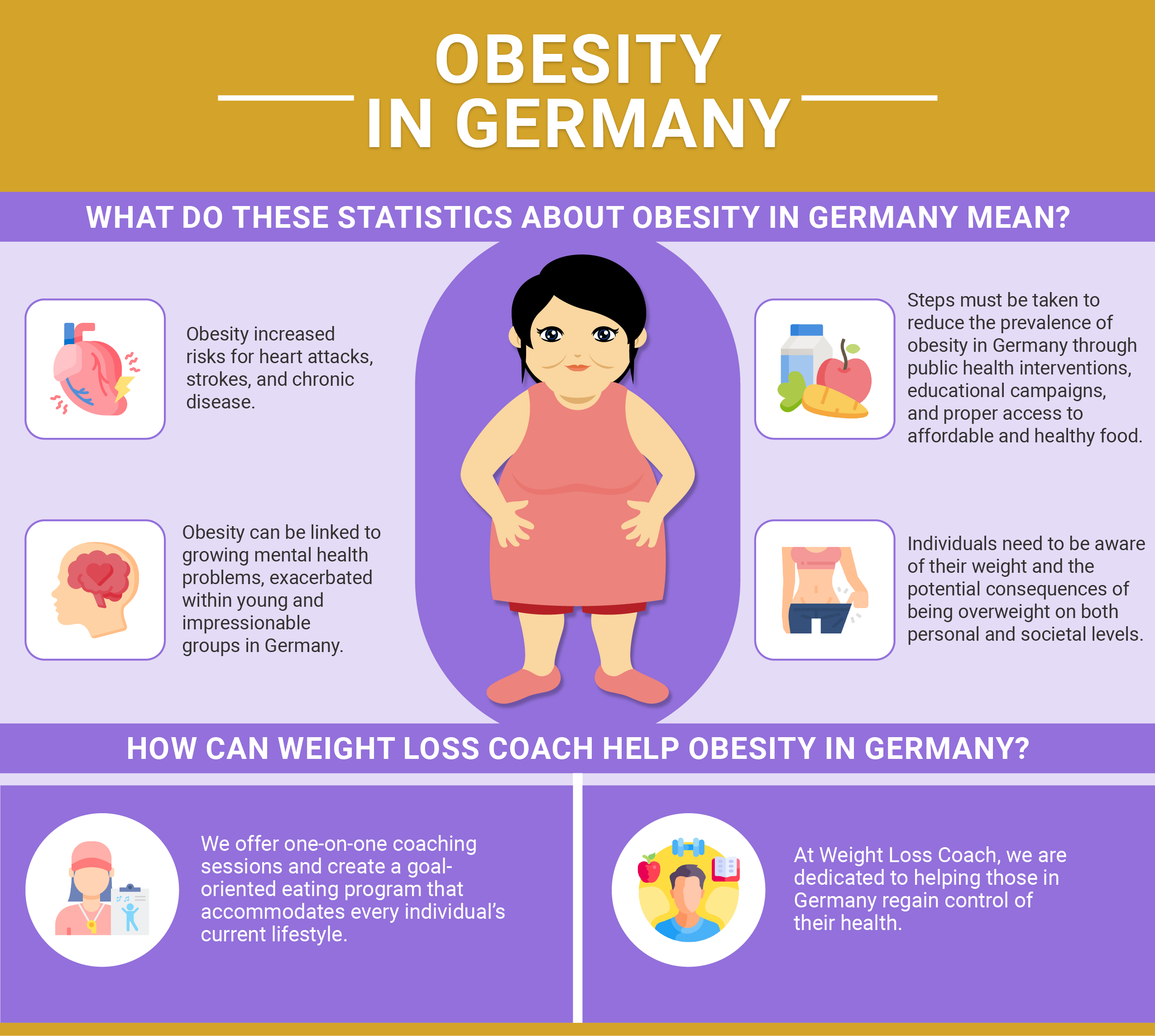In Germany, the obesity rate is alarmingly high. According to a study observing obesity data from recent years, 23.3% of adult women and 23.9% of men are obese, and the rate of obesity has been steadily increasing since 1990. Furthermore, the population of obese individuals is even higher, with 43.8% of men being obese and 29% of women obese. This is a cause for concern due to the number of severe health risks that being obese carries. This includes an increased risk of developing chronic ailments, including heart disease, type 2 diabetes, stroke, and certain forms of cancer. As a result, the Federal Government of Germany has released a report stating that they aim to halt the increase in obesity and overweight by 2030. This report is based on the World Health Organization's (WHO) Global Action Plan.

Germany has been struggling with an increasing obesity and overweight problem for years. A recent study known as the GEDA study has shown that the prevalence of obesity and overweight individuals have only increased in recent years. This study used self-reported data such as height and weight to measure the prevalence of obesity and overweight in Germany. Interestingly, compared to a prior study, it was found that the self-reported weight data showed an increase in obesity and overweight individuals. While these findings are concerning, they are not entirely surprising.
The study relied on eligible participants to self-report their weight for the study. However, this method of gathering data may lead to overestimated body heights and weight. Therefore, BMI may be lower than those who were measured directly. Despite this, the analyses were conducted with 23,791 participants using verified data. This included adult participants 18 years and older, 13,006 of which were women and 10,785 of whom were men. The data calculations were collected about gender, age, and district type. The district type accounts for how urbanised these populations are and reflects regional distribution in Germany.
The results revealed that while obese or overweight men are statistically more common in the population, there is little difference between women and men in terms of overweight and obesity rates, as the prevalence has steadily increased by 2% over the years. The results indicate that 46.7% of women and 61.6% of men in Germany have a BMI over 25, marking the state of being obese. Further, 28.8% of women and 43.3% of men have a BMI between 25 and 30, which 18.1% of adults in France being obese. The previous GEDA had indicated that 45.8% of women and 59.7% of men were overweight or obese, though the difference between sexes has not increased. Ultimately, overweight and obesity rates have been steadily growing in France over recent years. With this in mind, the prevalence of obesity and overweight is likely to continue increasing if no interventions are taken.
In terms of location, the study also found that the obesity prevalence was highest among women in Brandenburg and Mecklenburg West Pomerania and men in Mecklenburg West Pomerania and Schleswig-Holstein. Hamburg and Baden-Württemberg had significantly lower obesity prevalence estimates for both women and men. There was a gradient from the northeast to the southwest, with higher obesity rates in Brandenburg and Mecklenburg West Pomerania and a lower presence of obesity in Baden-Württemberg. This result was consistent with the data from rural and urban distribution by region in Germany.
The statistics show that weight rates have been steadily increasing in France, indicating the need for interventions to address this growing health concern. Furthermore, these results are consistent with surveys conducted in previous years. It also appears throughout these studies that obesity and overweight prevalence has increased a substantial amount amongst younger age groups. Both GEDA studies indicated that obesity and overweight prevalence had increased from 5.5% to 9.7% for women and 5.4% to 8.9% for men in the 18 - 29 age group. As for those over the age of 65, no increase in obesity or overweight prevalence has been observed by researchers.
Obesity and overweight rates have increased in Germany over the past few years. This can be attributed to various factors but ultimately underscores the need for further interventions to address this public health concern. Furthermore, this research highlights the need for health initiatives targeting younger age groups, who appear to be the most at risk of developing obesity or becoming overweight. However, implementing earlier interventions may reverse the trend and ensure individuals will go on to maintain healthier lifestyles.

Obesity is a pressing public health issue in Germany, as well as around the world. It has been linked with several comorbidities, such as increased risks for heart attacks, strokes, and chronic disease. Further, obesity can be linked to growing mental health problems, exacerbated within young and impressionable groups in Germany.
For these reasons, steps must be taken to reduce the prevalence of obesity in Germany through public health interventions, educational campaigns, and proper access to affordable and healthy food. In addition, individuals need to be aware of their weight and the potential consequences of being overweight on both personal and societal levels. Only when these problems are addressed can Germany begin to combat the current epidemic of obesity.
Weight Loss Coach is dedicated to combating obesity in Germany. Our program is tailored specifically to each client’s genetic makeup, which has proved successful for most people. Our team of physicians will help keep those in Germany struggling with weight loss motivated on their health journeys. We offer one-on-one coaching sessions and create a goal-oriented eating program that accommodates every individual’s current lifestyle.
Additionally, we may pursue pharmacological interventions such as GLP-1 medication to help facilitate weight loss if it is deemed appropriate. Our curated selection of medications will make weight loss easier, rapidly improving the lifestyle of those in Germany. The structured program is designed to improve eating patterns and habits, so everyone can achieve their desired weight loss goals.
At Weight Loss Coach, we are dedicated to helping those in Germany regain control of their health. We understand the difficulties associated with weight loss, and we aim to be there for support every step of the way.

Comments